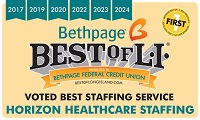New Jersey’s Projected Nursing Shortage
New Jersey is bracing for a severe nursing shortage that could rank among the worst in the nation by 2036, according to a recent report from NJ.com. This anticipated shortage highlights a troubling trend that could severely impact healthcare delivery in the state. New Jersey isn’t the only state that will be faced with a nursing shortage. The entire U.S. is projected to experience a shortage of Registered Nurses due to Baby Boomers aging, the need for healthcare growing, and many other factors.

Cause of New Jersey’s Projected Nursing Shortage
There are several factors that contribute to this potential crisis. One of the bigger factors contributing to this shortage is nursing school enrollment not growing fast enough to meet the projected demand for RN and APRN services. According to American Association of Colleges of Nursing (AACN) report on 2023-2024 nursing school graduates and enrollments, U.S. nursing schools had turned away 65,766 qualified applicants. This was due to insufficient number of faculty, clinical sites, classroom space, budget restraints, and clinical preceptors.
Another factor driving this crisis is an aging nurse workforce that is reaching retirement age, creating a significant gap in available professionals. Compounding this issue is the fact that there is an insufficient number of new nurses entering the field to replace those that are retiring or leaving. This leaves current nurses with an imbalance of high levels of burnouts and job dissatisfaction. Since 2020, one third of New Jersey’s nurses have left the bedside.
Effect of New Jersey’s Projected Nursing Shortage
This projected shortage is expected to strain New Jersey’s healthcare infrastructure. This can potentially lead to longer wait times and decreased quality of care. A decrease in nurses leads to overworked and understaffed facilities. Understaffing in our hospital facilities attributes to a patient crisis as studies have shown that this causes an increased risk of death, complications, and lower patient satisfaction. As New Jersey’s projected nursing shortage faces these concerns, NJ must take proactive measures to address the issues we are facing, including increasing investments in nursing education and improving working conditions.
Solution Efforts
In an effort to combat New Jersey’s projected nursing shortage, Ramapo College introduced an accelerated bachelor of science in nursing program. This announcement aimed to address the licensed nursing shortage by creating a fast paced program for nursing students to enter the field quickly. Instead of taking four years to complete the program and earn licensure, the accelerated program allows students to earn their license in as little as 16 months.
In February of 2024, Governor Phil Murphy announced his plan to invest $5 million into creating a “Nursing Workforce Initiative”. This budget aims to help aspiring nurses to pay off their student loans and fuel grants for job training. While this plan addresses the recruitment portion of this crisis, it does not address the retention problem we see in the healthcare field.
Last year, U.S. Representative Josh Gottheimer, announced a $3.8 million federal investment to help train more nurses. This investment hit close to home as it was invested in the Sister Claire Tynan School of Nursing, which is ran by Holy Name in Bergen County, NJ. This funding was an effort to combat New Jersey’s projected nursing shortage as the money helped invest in providing more faculty, simulation training, equipment, and by making it more affordable for nursing students. By having the funds to hire more faculty and expand the nursing program, the school is able to accept more nursing students.
Conclusion
As New Jersey faces this potential crisis, addressing these challenges will be crucial for our future. The state must focus on solution efforts to ensure that the state’s healthcare system remains robust and capable of meeting the needs of its residents. Although the nursing shortage is an issue across the entire U.S., NJ is projected to be the 4th state to be the most impacted. By increasing budgets, adding accelerated nursing programs, and lowering nursing program tuition, NJ can get ahead and start to turn this projection around.

